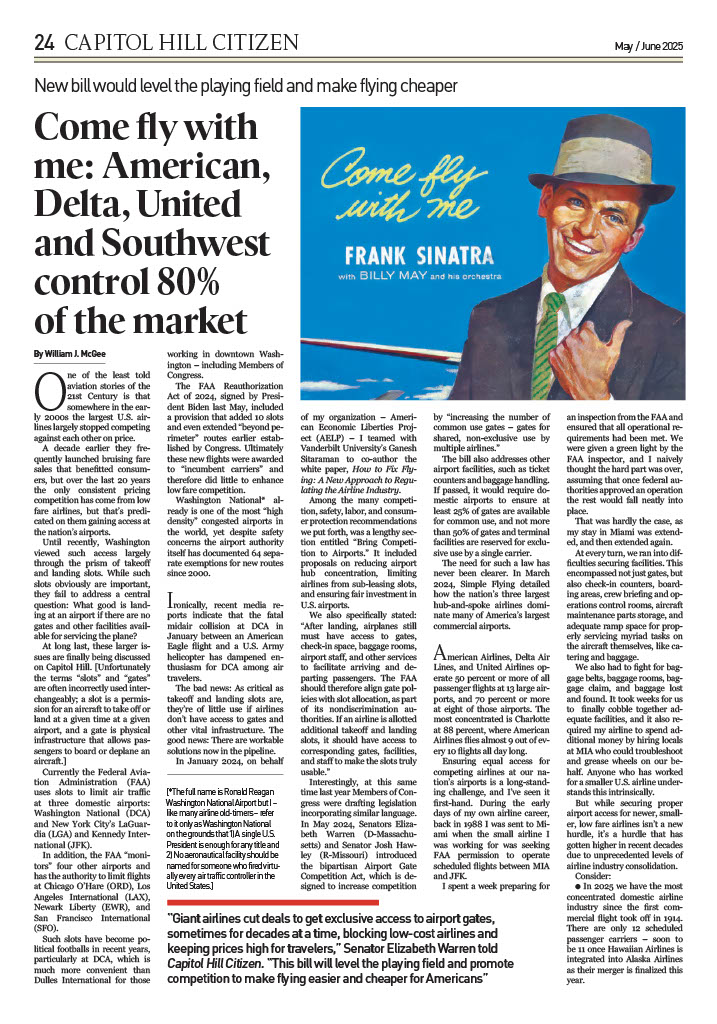American, Delta, United and Southwest control 80 percent of the domestic passenger airline market. And one of the least told aviation stories of the 21st century is that somewhere in the early 2000s, the largest U.S. airlines largely stopped competing against each other on price.
A decade earlier they frequently launched bruising fare sales that benefited consumers, but over the last twenty years the only consistent pricing competition has come from low fare airlines, but that’s predicated on them gaining access at the nation’s airports.
Until recently, Washington viewed such access largely through the prism of takeoff and landing slots.
While such slots obviously are important, they fail to address a central question: What good is landing at an airport if there are no gates and other facilities available for servicing the plane?
These larger issues are finally being discussed on Capitol Hill. (Unfortunately the terms “slots” and “gates” are often incorrectly used interchangeably; – a slot is a permission for an aircraft to take off or land at a given time at a given airport, and a gate is physical infrastructure that allows passengers to board or deplane an aircraft.)
That’s according to a report from William McGee in the current issue (May/June 2025) of the Capitol Hill Citizen.
As critical as takeoff and landing slots are, they’re of little use if airlines don’t have access to gates and other vital infrastructure. The good news: There are workable solutions now in the pipeline.
In January 2024, on behalf of the American Economic Liberties Project (AELP) – Mc Gee teamed with Vanderbilt University’s Ganesh Sitaraman to co-author the white paper, How to Fix Flying: A New Approach to Regulating the Airline Industry.
“Among the many competition, safety, labor, and consumer protection recommendations we put forth, was a lengthy section entitled – Bring Competition to Airports,” McGee writes. “It included proposals on reducing airport hub concentration, limiting airlines from sub-leasing slots, and ensuring fair investment in U.S. airports. We also specifically stated: ‘After landing, airplanes still must have access to gates, check-in space, baggage rooms, airport staff, and other services to facilitate arriving and departing passengers. The FAA should therefore align gate policies with slot allocation, as part of its nondiscrimination authorities. If an airline is allotted additional takeoff and landing slots, it should have access to corresponding gates, facilities, and staff to make the slots truly usable.’”
“Interestingly, at this same time last year Members of Congress were drafting legislation incorporating similar language. In May 2024, Senators Elizabeth Warren (D-Massachusetts) and Senator Josh Hawley (R-Missouri) introduced the bipartisan Airport Gate Competition Act, which is designed to increase competition by ‘increasing the number of common use gates – gates for shared, non-exclusive use by multiple airlines.’”
“The bill also addresses other airport facilities, such as ticket counters and baggage handling. If passed, it would require domestic airports to ensure at least 25% of gates are available for common use, and not more than 50% of gates and terminal facilities are reserved for exclusive use by a single carrier.”
“Giant airlines cut deals to get exclusive access to airport gates, sometimes for decades at a time, blocking low-cost airlines and keeping prices high for travelers,” Senator Elizabeth Warren told Capitol Hill Citizen. “This bill will level the playing field and promote competition to make flying easier and cheaper for Americans.”
(For the complete story, get a copy of the Citizen at capitolhillcitizen.com)
